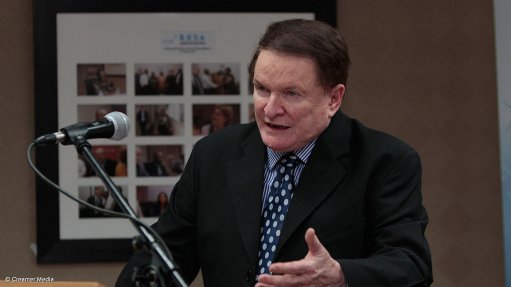
Professor Raymond Parsons
Photo by: Duane Daws
The North-West University (NWU) School of Business and Governance’s Policy Uncertainty Index (PUI) increased to 51 in the first quarter of this year, putting it in negative territory.
The PUI was at 38.8 in the fourth quarter of 2016. An increase to above 50 reflects heightened policy uncertainty, while a score below 50 indicates reduced uncertainty.
“The removal of former Finance Minister Pravin Gordhan and the way in which the Cabinet reshuffle has generally been handled has had a negative impact on markets and investor confidence,” NWU school of business Professor Raymond Parsons said at a media briefing, in Johannesburg, on Thursday.
He added that the global economic outlook‚ the national budget and the economic impact of political decisions, along with the credit ratings downgrades by Standard & Poor’s and Fitch, were the main contributors to the spike in the PUI.
“The risk of another investment downgrade in June has also risen in the aftermath of the Cabinet reshuffle. The recent concerns of the credit ratings agencies about the economy have revolved around market doubts generated by the removal of Gordhan from his post,” Parsons said.
He noted that the financial markets and credit ratings agencies would also expect to see conservative fiscal policies still being followed and the antipatronage stance taken by Gordhan being upheld.
Parsons added that government’s ambitions for radical economic transformation was another source of uncertainty for investor confidence.
“No one really knows what is being referred to when you throw around those terms. It is mentioned in conjunction with land reform and the nationalisation of mines and banks. We all agree that the economy has to be transformed, the question is how, and in what way,” he said.
Parsons stated that priorities needed to be highlighted and that there needed to be a blueprint outlining steps that need to be taken to ensure transformation, something that was still lacking.
He highlighted that there were fears and suspicions that fiscal probity would become “a victim of political factionalism”.
“The danger is also that the credibility of the National Development Plan will be put at risk,” he said.
He said the onus would be on Finance Minister Malusi Gigaba to win the confidence of the both foreign and domestic investors by following policies and making decisions which are clear, ethical, consistent and growth-oriented.
Parsons added that the risk of the South African economy moving into a recession had increased and that the country’s growth rate this year would probably be below 1%, noting that policy uncertainty had inevitably risen, which was not helpful for encouraging the private fixed investment that South Africa needs to grow more rapidly.
“The damage to trust and confidence in these important relationships will need to be repaired if South Africa’s economic performance is to continue to successfully mobilise collaborative effort,” he said.